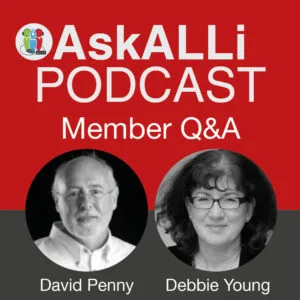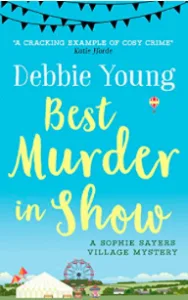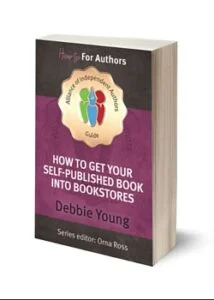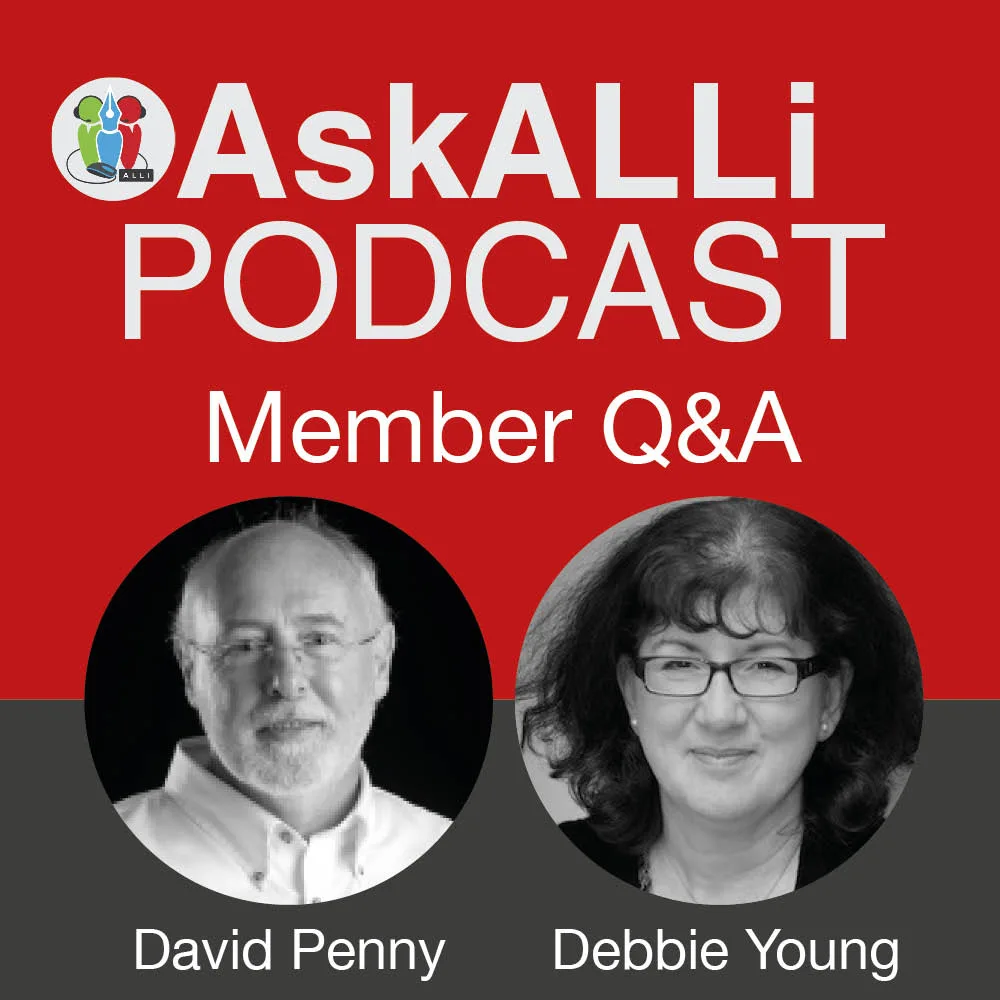 Each month David Penny and Debbie Young are in the indie author hot seat to answer the most pressing questions from our ALLi Members. Between them they have a wealth of self-publishing experience to share, and both love nothing more than sharing their advice and experience with other indie authors just like you, so that you are prepared and ready to travel along the self-publishing path to success.
Each month David Penny and Debbie Young are in the indie author hot seat to answer the most pressing questions from our ALLi Members. Between them they have a wealth of self-publishing experience to share, and both love nothing more than sharing their advice and experience with other indie authors just like you, so that you are prepared and ready to travel along the self-publishing path to success.
Even though only members can submit questions, the broadcast is accessible to everyone to learn from. Join us each month to watch the broadcast recording, listen to the podcast, or read the full transcript.
Summary of our Ask ALLi Self-Publishing Member Q&A Topics:
- Amazon Page Count Calculation
- Facebook & Amazon Advertising ROI tracking
- Pricing your ebook, print book, and box sets
- Publication Strategy for a Book Series
- Pre-orders
Listen to the Podcast
Subscribe to our Ask ALLi podcast on iTunes, Stitcher, Soundcloud, Player.FM, Overcast, Pocket Casts, or via our RSS feed:
Watch the Video
Click here to subscribe to our YouTube Channel
Members’ Self-Publishing Q&A Transcript
David: Hello and welcome to ALLi’s Self-Publishing Questions and Answers with Debbie and Dave. I’m David Penny and I write historical mysteries and I am the technical manager of ALLi. And Debbie is …
Debbie: I am the publications manager for ALLi, I’ve been, for the last few years, I’ve been the commissioning editor for the Author Advice Blog and now my role is changing slightly, in that I’m going to be responsible for all of our wonderful guide books and other publications as well as for the blog. So, that’s very exciting and we’ve got lots of plans coming up as well as lots, to produce new books as well as to share the books that we already have in what’s turning out to be quite a handy and invaluable library for all self-publishing authors.
Amazon Page Count Changes
David: Great, great. We’ve got a few things to talk about this evening. The show will last about half an hour or so, depends on how carried away we get or how tired we get. We’re going to start with a little bit of news that came up, I think, only today. I had an email from Amazon that came through and said we are changing the way that Amazon Page Counts are being calculated. And as Amazon always say, to make it more equitable for all authors. I think Amazon are constantly fighting against people who are trying to take advantage of the systems they have set up. So, at the moment there are these things called click farms, where sweated labor are opening browsers and clicking on pages to read through people’s books and authors are paying these firms to actually do this because you get paid about, I think in cents terms it’s 0.04 cents per page read, in the UK it’s something like 0.03 pence. And it sounds like a pittance but to be honest, I earn at least 40% of my income every month from page reads. Last month I had close to half a million page reads and if you multiply half a million by 0.0.3 pence, it’s soon mounts up. So, it’s worth doing but there’s been some conversation on the bulletin boards and Facebook and elsewhere that, there’s two trains of thought as there always is with Amazon.
One is, they are the devil incarnate and they are ripping the world off. And the other is, and this is my view, that they are great, if it wasn’t for Amazon I wouldn’t be making any money on my writing what so ever and I wouldn’t be selling any books because there wouldn’t be anywhere to sell them. I think a lot of this change will be to do with trying to reduce things like click farms and so on. So, hopefully, this morning, before the change took place, I made a note of what my Kindle page counts were, and maybe towards the end of this week, I’m going to go back into my dashboard and just out of interest, have a look at what the page counts are then, to see how they have actually changed. Which will be interesting. So, that’s the big news on Amazon this week and it’s hot off the press because it came out today.
Debbie: Yes, yes, I had that same email in my inbox as well. And it’s that time of the month with it just having flipped over on to the 1st of August, you go to look at your figures on KDP and you think oh my goodness, I haven’t sold anything, oh no, it’s the 1st, it’s ok [laugh].
David: It is, yes. I use Book Report, do you use that at all Debbie?
Debbie: I have used it in the past but to be honest, I haven’t looked at it lately because there’s just only so many things one can do. And I think it’s very easy to spend a lot of time and effort looking at your figures in all different ways and getting anxious about it. And I’ve actually, let me see if I’ve got it here, I’ve resorted to old technology and I’ve got a little book model, one of these little date book type things, and I’ve got a little grid where I’m putting my numbers down every day at the same time every day. And it’s quite nice because you can see at a glance where you are. It’s quite therapeutic because you’re like right, I’ve done that, I’m being responsible, I don’t have to worry, back to work [laugh]. And you get on with whatever else you’re doing.
Related Post:
Facebook & Amazon Advertising ROI tracking
David: I always go in and look at my figures every morning, which a friend of mine, Zoë Shark, who is quite a well known writer says checking your statistics every day is the road to madness, which it probably is. But because I also spend quite a lot of money on Facebook advertising, I don’t want it to run away without me getting a return on it. So, I check all of the statistics every day.
Debbie: Yeah, I think it’s important to do that. I haven’t ventured into Facebook advertising but I’ve been playing around with Amazon adverts and it really is essential there, to check every day and to turn off key words that aren’t working for you, maybe to change your prices on different ones, and that are working. And also to put your daily budget up and down as well. I love it because there’s so many things that you can do to tweak it and you feel, well, not totally in control but a lot more in control than with Facebook advertising, I think. Again, it’s easy to get addicted.
David: Yeah, I noticed lately they’ve been taking more than my daily budget in some cases, on Facebook, and they will, you know. If your ad is going well, they say, if your ad is performing well, we will spend more than your daily budget because you are making money on your ads sort of thing, assume you are otherwise you wouldn’t be doing it.
Debbie: It’s a bit high handed though isn’t it, when they don’t actually give you choice? Because I’ve noticed with Amazon advertising, they actually send you an email, don’t you, saying oh, you’re about to go over your budget, you might like to put it up a little bit, this is what we think you should put it up to. So, when they had the Prime day a little while ago, they were expecting a lot more traffic, and I think I bumped my budgets up for a couple of days to go through that but then put them back down again.
David: It’s quite useful for them to do that. And I tell you why it’s good, is I know that Mark Dawson says Facebook are awful because they will take every sent you give them and more. And Amazon are awful because they won’t spend the money you want them too. So, I think Amazon are beginning to get their act together a little bit and fine tuning this. I noticed that, when you spend more on Amazon, then you do see your sales increase, the same as you do on Facebook. So, they are quite good.
Related Post:
Pricing your ebook, print book, and box sets
David: But anyway, we’re getting off track a little bit. So, we’ve got three question areas we’re going to talk about today. And the first one is ebook pricing. Can you remember how this came in from Debbie, or is it just a journal?
Debbie: It’s come from a few people actually, it comes up quite often, all on the ALLi forum, the Facebook forum that’s our member’s only one. And I think it’s particularly, it’s a particularly anxious moment for new authors who haven’t self-published before because they get to the point where they’re, you know, you’ve put everything else in to publish it and you get to the point where you’ve got the prices coming up on the dashboard and you realize that the buck stops with you for pricing and although it’s wonderful that we can all determine, choose our profit margins within the parameters that Amazon so forth dictate, we can choose them but you then also have the responsibility for choosing right. And that’s quite a hard thing to do because one of the common things that comes up quite often is that people say I’ve spent so long on this book and all the hours, I can’t bear to, particularly on paperbacks, where it’s harder to make a big margin, people will say I can’t bear to only be making £1 a book or something.
We had somebody the other day, I won’t say who it was because it’s confidential information about their own pricing but they came back and said, oh, but I only made £2.53 per paperback, and this is on a book with a list price of £9.99, a retail price of £9.99 and you think crickey, that’s 25%. If you were trade published, you’d probably get 5%, 10% absolute tops but 5% is the mean. So, it’s, there’s a real middle course to be steered between optimizing your profit and optimizing your sales because there’s no point in having a huge margin, if you don’t sell any books because they’re too expensive.
David: Yeah, if they’re making £2.53 per paperback, it must be about 200 pages or something, I would imagine, not much more than that.
Debbie: Yeah, funny enough, I bought a copy of the book because it sounded like a nice book [laugh] and I think it’s about 250, it’s beautifully presented, it looks good value for £9.99 and they’ve sold a lot in their local bookshop as well.
David: You were talking about people saying, you know, they were not happy with making a £1 a book or something. One of my bug bears, I must admit is, I have little sympathy for people who come along and say I spent a year or two years or three years or seven years writing this book. I’ve poured my life into it and I think it’s worth £14.99. A book is worth what people are willing to pay for it, not what you think you need to make back for the amount of time you put in to it. One, I’ll just run through, other outlets, other retail points have different rules, but if I just cover Amazons and then just very briefly mention the others.
If you price your book below 99p or 99c, you will make 30% of the sale price. So, you will get little less than 30p or 30c per sale on that sale, the e-book. All other e-books, you will make 70% of the sale price, so if you price it up for 4.99, you’re making about $4 or £4 on that book. The thing to bear in mind is that if you price your book above $9.99 or £9.99, your royalty drops back to 30% again. And that’s because Amazon thinks e-books priced higher than £9.99 are poor value for money, which I would totally agree with. I have some authors who are automatic buyers, but I always wait until their books come down to 4.99 or below before I buy them and sometimes that takes a year, sometimes 18 months but I simply won’t pay.
Amazon does have a little tool that will help you calculate a pricing point but generally I think, for most indies, if you’re charging $4.99 in the states, £3.99 in the UK, equivalence in euros, etc. etc. That’s a reasonable price point for my kinds of books, which tends to go 100,000 words. I like to think that if your books are, some people are doing short novellas and so on, and therefore I would expect to pay less for them too.
 Debbie: Yeah, I agree. Mine are much shorter, my novels are much shorter than yours, about 60,000 words and I think I’ve got them on the list at .99 at the moment, but then I’ve got more out, because it’s a series, I’m going to play around with pricing then but we’ll come back to talk about series pricing in a minute.
Debbie: Yeah, I agree. Mine are much shorter, my novels are much shorter than yours, about 60,000 words and I think I’ve got them on the list at .99 at the moment, but then I’ve got more out, because it’s a series, I’m going to play around with pricing then but we’ll come back to talk about series pricing in a minute.
David: Yes, because that is something you need to bear in mind and I think it depends on how many books you have in the series and how much you really want to build up your readership and draw them in. There’s other issues like when you’ve got so many books, do you do a bundle, to do a discount?
Debbie: Box sets, do you do a box set David?
David: I do, the first three are available and I think it’s about 25-30% cheaper than buying them individually and my box set is actually $6.49 in Amazon.com, which is not bad really, considering, I sell one to three copies a day. And it gets reviews as well, yeah, which is great.
Debbie: Yeah, I always wonder about that because if you have reviews on the books individually, they don’t get applied to the box set do they, its separate sets, so that’s another thing to consider if you’re thinking about whether to do a box set or not.
David: Yeah, I’m not sure if the box set, I don’t think the box set or series is actually linked because the box set is outside of the series on my Amazon page. So as far as Amazon is concerned, they’re completely different products, so there is no linkage there. But, yeah, so, there’s e-book pricing and there’s also print book pricing that is another consideration.
Debbie: Yes, and that’s really tricky because, whereas with Amazon, when you’re setting your own prices, it’s pretty clear cut that the price you set is the price that applies until you decide to change it, both on KDP and on CreateSpace, for the, although, they do, for reasons best known to themselves, and I’m sure they’ve got an algorithm for it because they’ve got an algorithm for all eventualities, they will sometimes reduce your price without telling you, it always surprises me that they don’t tell you because it’s nice to promote it to people when you know you’ve got a lower price. Because when Amazon reduces a price, you still get the full royalty that you would get.
 So, for example, at the moment and for the last couple of months, my Best Murder in Show, the first novel in my mystery series is priced at £7.99, I think, $9.99 and they’ve knocked a pound off for the last two months, for no apparent reason but I still get the same royalty that I would get, if it was at full price. But, it’s also for sale though IngramSpark, so book stores can order it and I’ve set the price there at £7.00, $9.99 and I don’t have control, or I have control over setting the discount in the Ingram pricing grid, because you have quite a lot of leeway about what discount you set.
So, for example, at the moment and for the last couple of months, my Best Murder in Show, the first novel in my mystery series is priced at £7.99, I think, $9.99 and they’ve knocked a pound off for the last two months, for no apparent reason but I still get the same royalty that I would get, if it was at full price. But, it’s also for sale though IngramSpark, so book stores can order it and I’ve set the price there at £7.00, $9.99 and I don’t have control, or I have control over setting the discount in the Ingram pricing grid, because you have quite a lot of leeway about what discount you set.
But what a lot of people don’t understand is that when bookstores order in your books, they don’t buy it direct from Ingram in most cases, unless they’re using this new system that Ingram have just brought out, which enables them to order directly but that’s not universal yet. But it’s spreading.
 Bookstores buy from wholesalers or distributors who also take a cut off that discount. So, if you’ve put 40% as your discount and it has to range between about 35-55% depending on the country, there are different criteria in each territory. If you put 40%, it doesn’t mean that the bookseller who sells it in his shop, necessarily gets 40%. The middleman will also, quite reasonably, because they’re providing a service, they will take their cut as well. So, the bookseller might get 25-30% and a lot of, one of the reasons that we wrote The Bookstore, our new ALLi guidebook about how to get your self-published books into bookstores is to explain the complexities of that system. Because, once you know that’s how it works, and knowledge is power and you can then re-jig your prices accordingly. And so, if people haven’t already read that book, downloaded it, if you’re an ALLi member, you can download it free of charge, that’s How to get your Self-Published Book into Bookstores. But it’s also available as an e-book, at the moment, and a paperback will be out around September time.
Bookstores buy from wholesalers or distributors who also take a cut off that discount. So, if you’ve put 40% as your discount and it has to range between about 35-55% depending on the country, there are different criteria in each territory. If you put 40%, it doesn’t mean that the bookseller who sells it in his shop, necessarily gets 40%. The middleman will also, quite reasonably, because they’re providing a service, they will take their cut as well. So, the bookseller might get 25-30% and a lot of, one of the reasons that we wrote The Bookstore, our new ALLi guidebook about how to get your self-published books into bookstores is to explain the complexities of that system. Because, once you know that’s how it works, and knowledge is power and you can then re-jig your prices accordingly. And so, if people haven’t already read that book, downloaded it, if you’re an ALLi member, you can download it free of charge, that’s How to get your Self-Published Book into Bookstores. But it’s also available as an e-book, at the moment, and a paperback will be out around September time.
David: I must admit, I’m very lazy when it comes to print. I always, I have this little saying which is stolen from business, that e-books are sanity and print is vanity. As authors we love to hold, you know, I love to hold a copy of my book because it just feels nice to flick through it. Set it up under the pillow and stroke it once or twice in the night. But, I make, I will maybe sell one to four print books a day and I’m selling close to 100 e-books so, you know, it’s about 3 to 4% of what you would sell an e-book of, so it is very difficult, and part of that is pricing. Part of that is, as indies, we don’t have access to bookshops in a way that traditional publishers will have.
Debbie: No, it’s hard because the way that traditional publishes work is that they have, their books are all represented. You have a rep going around, from a publisher or distributor, who is selling in 100, 200 books in every visit to a bookshop. They’ve got a scale of economy that enables them to do that cost effectively. We can’t, you know, you have to think twice, whether it’s going to be viable just for you to just take your book to your local bookshop, never mind try and reach every other bookshop there is. So, you do have to think long and hard but if you have a good relationship with your local bookshop and also with other organizations such as festivals, or you go to festivals or writing events, or if you give talks at your local libraries or to local community groups or whatever, you really, really do need the print book. And there’s an awful lot of people who don’t believe you are an author until you can show them the physical book, it’s made but it’s the way it is.
David: I know, or people say I’ve gone to my local Waterstones and they don’t stock your book. And I say, have you asked them for it and they said no. And I said well, ask them for it and they will get it in. Which they generally do, so yeah, but you will not walk into Waterstones and find my books or your books on the shelves, alongside, you know, big named people like Ian Rankin or whoever. They are very much a minority thing in those big bookstores but hopefully some of that will change but we’ll have to see how that goes.
One of the other questions we had which was kind of to do with pricing and not is series pricing, so, if you have a series, and you’re writing a series, I have a series, not everybody does so but how should you price, primarily I think the first book in your series? And some people would argue, to make the first book in your series free, as a loss leader to draw people in. I’m not of that mind but even so, I price my, the first book in a series is 1.99 and others are £2.99, so, they’re a pound more. There’s not a huge jump in price. And it’s similar, I think the dollars are $2.99 and $3.99. But that initial book, I think, once you have, when you’re about to start to go into this situation Debbie, once you have three books or more, I think it’s a strategy you can pursue.
Initially you might, when I had one book, it was, I think 3.99 but once I got a second one, I reduced the price of the first, and that has even more effect, as you get the second, the third, the fourth, and fifth and six and so on, as you go through. People need an enticement to buy into a series and if you’ve written a series well enough and if you’ve written that first book well enough, and I wish I’d written my first book better than I did because I’d like to go back now and redo it but I’m not going to do that because it’s a total waste of time. Then people will go on to read the subsequent ones and you will find, you know, I have some people who are absolute rabid fans and they just sit there and they email me and they Facebook and they say, come on, get on, I need the fifth book, it’s not out yet and I’ve read all the others and I can’t wait for the next one. And you say, well, it will be next year and you say, no, that’s too long. And I say well, do you want it right or do you want it now [laugh]? It comes from when I used to write software. So, what’s your take on that, in terms of series pricing, Debbie?
Debbie: I think it depends how closely together you’re publishing them as well, because that’s another question that we had from a chap called Mike Stone. Which we will come back to in a minute. Because, if you’re publishing them slowly and steadily, you can play around with the prices as you go along. I mean, my first two, well, the second one in the series, Trickle Murder, will be published on the 21st of August and at the moment, I’ve got that set up on the pre-order to be the same price as Best Murder in Show. But, once I’ve got three or four out, I’ll probably reduce Best Murder in Show to 99 or 1.99 and have the subsequent ones a little bit more expensive because, by then, people who are going on to buy books, three, four, five, six, they are the ones who are really serious and they will pay more for it, you know, as you say, they’re the people who stop you in the street and say well, come on, what do you do? Why are you out here, you should be at home writing the next book! And I am trying to, one of the reasons that I’m now writing the third book as well, so from beginning of April to the beginning of November, I’ll have then, god willing, published the first three books in the series, in that short space of time, is so that I can then start playing around with the prices and do some price promotions. And I don’t know about a box set but certainly have the first one cheaper and play around there. Whereas if I had taken other advice, to hold back and publish all three at once, then I’d, although you have big slash because you have three books hitting the sales figures all at once, I don’t think I’d have the same flexibility. What would you do with the prices if you were power pushing three in the series all at once?
David: I think I’d have the first one cheaper, to draw people in. It’s a bit dispiriting because, you won’t have found this out yet but I suspect every author who writes series discover you sell more of your first book than any of the others. So, you don’t please all of the people with that first book and you will loose readers along the way. But once you’ve lost, and I think about 60% of the people who, I lose about 40% of the readers between book one and book two. But once they get to book two, they will buy book three and book and hopefully book, all the way up to eight, nine and ten.
Debbie: Because with the second, with the subsequent books, after the first one, you’re not having to sell the concept anymore are you? Once they’ve read the first one, they’ll know what the concept is and they’ll either like it or they don’t. and people who write stand alone books, who don’t like series at all, even if they’re writing books that are in the same genre and very similar in style and feel and mood and everything, it’s much harder for them to sell the same number of books that aren’t in a series. It’s why I’m really sold on the idea of series writing.
David: Yeah, a lot of people don’t write series, a lot of people don’t actually like the concept of writing series, it’s alien to the way they write but, I’ve written stand alones when I used to write years and years and years ago, it was always stand alones and not series. Although, coming back to my four published novels now, I realize they are actually a series but I didn’t realize it at the time.
Debbie: Because you can have a series, I know I had people say to me well I can’t like series, I don’t like series and, one of the authors was Clair Flynn who is a wonderful historical novelist and she said oh, I don’t like series, but actually, looking at her books, you could ground them as a series because they’re all about women in different parts of times in history, immigrating and starting new lives. And actually, you could turn that into a series, if you get into the mindset series and if you want to have a series. And I’m sure there are lots of people who are writing lots of, say, stand alone sci-fi or literary fiction, or whatever, who, it’s almost cosmetic, you can turn them into a series by giving them all the same strap line or giving them all the same cover branding. I mean, there’s Jessica Bell who is writing books across all different kinds of genre, including poetry and different kinds of novels and novellas and she’s actually given them the same physical branding on the cover, even though they’re completely different, which is quite an interest, I haven’t seen many people do that, but that’s an interesting thing. Branding is a, a series is a state of mind in a way, I think.
David: I think what people have to accept is that we are our own brand, that what we selling as a brand is yourself as the author, and if people like one of your books, they will probably like others. But to me, I might disagree a little bit with that. To me, a series has a continuity of characters in them. I buy into a series for the characters in the series, rather than any slightly more nebulous connection between them. But you’re right, in that you can brand yourself so if people like your work, they will get the same voice and the same treatment as with some of the others. So yes, it is possible to do that.
Related Post:
Publication Strategy for a Book Series
Debbie: Shall we move on to Mike Stone’s question because I think, I’m conscious that we’re running out of time. Mike Stone wrote to say he’s writing three books, very much a series and they’re about dogs in politics, I think it was a dog that becomes Prime Minster, they’re quite fun. And he’s …
David: Well, Churchill, he’s a dog isn’t he [laugh]?
Debbie: For viewers who aren’t in the UK [laugh], we ought to explain, there is a certain brand of insurance who uses a dog called Churchill. Yeah, Mike Stone, has written these three books about dogs in politics, they’re nearing completion and he’s in quandary because he doesn’t know whether he should save up and do all three at once or whether to publish them one at a time. Now, I think, you said to me in fact, when I started writing my Sophie Sayers series, publish the first three all at once. Now, I’m too impatient to hang on and do that because I like a bit of instant gratification and I was so desperate to test out the first one, to see if people liked it, which fortunately they did which is why I’m now writing a third one. And even though, I’ve only got a six month spread across the three books, that I’m writing them, it would have taken a lot of will power to hold back. Mike clearly has more willpower than I do, Mike Stone, what would your advice be to him, David?
David: Cause I did say to you, you should launch all three at once didn’t I?
Debbie: You did, yes, you did, I think Orna said to me, I’m just completely disobedient and impatient [laugh].
David: I know, I would be as well, I couldn’t hold back, you know. I’m only doing a book a year, so I wouldn’t wait three years to launch three together. In Mike’s situation, it’s obviously very different. I think, as you were talking about it then, I think I might recommend some sort of middle ground. As we were saying before, people will buy into your first in a series, if they like it they will buy the second and the third subsequent books. It might be worth thinking of publishing the first and then a fortnight later, publishing the second and a fortnight after that, publishing the third. So that you can stagger your releases, so you get a bit of a buzz going over a longer period of time rather than saying look, I’ve got three new books, buy them all at once. You can lead into the subsequent books, you can put them on pre-order so that if people liked the first one, they get, even if it’s only a couple of weeks, pre-orders we ought to come back to because I love, I absolutely love pre-orders.
Debbie: Yeah, you got me hooked on pre-orders as well. But just to finish with Mike then, Mike, I know you listened to our last podcast so I presume you’re listening to this one as well. Take your choice out of the advice that was given there, take your pick and do let us know how you get on but don’t blame us if it all goes horribly wrong [laugh].
David: We’re not lawyers, this is not legally binding, this is just what we think and what we think is what we make up [laugh]. We have no validity what so every, other than the way we have been doing it, I’ve been doing it for more years than I care to think about, three quarters of my life, so, that’s way too long. And I learn something every day which is a good thing. I think a day where you don’t learn something new or you don’t learn some new element of craft, is a day wasted really. That we should all be hungry for learning more, I think.
Debbie: Yes, absolutely. We all should be wanting to be the best we can be and better. And, I mean you’re saying, you know, you wish you could rewrite your first book in your current series and I’ve been thinking the same about mine, you know, I learn a little bit more with each one. But, in fact, that’s how it should be because if the first one was better than subsequent ones, then you’re doing something wrong [laugh] or you draw your series too long, that can happen.
David: It is yes, the other lesson to learn from that is that at some point you have to let the baby out into the big wide world and move on, even if you think you can make it better. You and I have both come across people who are 10 or 15 years into writing their first book. And it’s still not perfect so they’re not going to do anything with it. But I think sometimes you do have to move on because you have learnt lessons and if you start with a clean slate for the second book, then it makes it easier than just going back and rewriting and rewriting that first one until it comes up to scratch. Good.
Debbie: And I think you change as a person as well, in that time, you know? I’m writing different books to what I would have 15 years ago. I think sometimes people should ask themselves, if they’ve been writing a book too long, are you just finding excuses not to send it out into the world?
David: Yeah, sometimes there is this fear of judgment that prevents people from releasing, yeah.
Debbie: Fear of success as much as fear of failure and it could be either.
David: Good, ok. So, we’ve actually done better, oh, is there something else Debbie? Sorry?
Pre-Orders
Debbie: We did say that we’d just come back and talk about pre-orders. If we just want to clarify for anyone that doesn’t know how pre-orders work?
David: On Amazon, you can put a pre-order up three months in advance of publication date. On iTunes, you can put it up a year in advance. And I did a podcast with Mark, what’s his name, from SmashWords? That’s terrible, not remembering his name?
Debbie: Coker.
David: Mark Coker, who said, always put your book up for pre-order as long as you can, he likes the idea of one year pre-orders. So I always use the full three months now. And it’s interesting how the momentum builds for it. But, some people like pre-orders and some people don’t. From my own personal view point, I think they’re a great idea, but you are encouraging people to buy into your series in advance and you are building up a buzz so that on launch day, on Amazon, your book gains a ranking for each pre-order it gets. On Apple, all of your pre-orders contribute to your rank on the day of launch. So, you can suddenly bounce from nothing to like number three on Amazon, on something like a 1000 pre-orders, which is not beyond the realms of possibility.
Debbie: You had 700 for your last one, didn’t you?
Related Post:
David: I think I did, the first pre-order I did was for book three and it had 72 pre-orders. The fourth book in the series, I put on pre-order and it had just over 800 pre-orders. Part of that is building up the series brand and part of it is just being consistent. That’s something that you have to remember when you’re starting out, in particular, consistency is vastly underrated and it’s what readers are looking for. It’s why Lee Child is, Lee Child sells a book every five seconds which is a scary thought. And he does it through, whether you like he’s books or not, and I know there are millions and millions of people [laugh] who think he’s a terrible writer, he is nothing if not consistent. So, if you buy a Lee Child, you know exactly what you’re going to get. Big man, beats bad people up, the end [laugh]. Unless you watch the movies [laugh]. So, yeah, I think pre-orders are a good idea. Some of these questions that we’ve discussed tonight, Debbie, almost need a half hour slot on their own because there’s a lot of stuff we’re skimming over here.
Debbie: Yeah, people shouldn’t forget, also, that we’ve got loads of blog posts. We’ve got over 1500 blog posts in our archive on the Author Advice Centre, that’s www.selfpublishingadvice.org and there is, of course, a handy search box in there, so if there is any particular topic that you want to look up, for example, pre-orders, punch the key word in the search box and it will give you how ever many, about that particular topic. And that’s a really, really good way of getting a quick head start on the different topics. We’ve also got a series of publications which are free to download, for members to download. So, if they’re free, why wouldn’t you and they’re all going to be, hopefully later this year, they will all be available in paperback as well. So, not already, if you’re watching this and you’re not already a member of the Alliance of Independent Authors, it’s certainly worth joining. Well, there’s 21 different reasons we’ve got listed to join ALLi but one of the great reasons is that we have a private, members only forum on Facebook, where you can go online any time of day or night, ask your question there and there’s, I think we’ve got about 1200 active members of that forum, at the moment, out of the many more thousands of membership we’ve got, those are the ones who choose to go on the Facebook forum. But it means, and they’re all over the world, so whatever time you go on there, you will get answers to the questions you put on pretty promptly. Not just one answer, you’ll get lots of feedback from lots of people who have sort of been there, done that, before you. David and I are on there a lot as well, as is Orna and lots of other people.
David: Great, thank you Debbie. So, you will see Debbie and I again on the 5th of September, which happens to be my birthday, so cake!
Debbie: Oh really, it’s my dad's birthday as well. All the best people’s birthdays.
David: So, two lots of cake Debbie, yeah.
Debbie: He’ll be 86 though, so he’ll be a bit older than you.
David: Not much older [laugh], not much older unfortunately. I’ve got to write a lot of books between now and then, a lot of books to write. So, we’ll be back with our next question and answer session on the 5th of September, 5 weeks today and if anybody is going off on holiday or lazing on the beach, have a great time. And we will see you five weeks from now, bye-bye.
Debbie: Yes, have a lovely holiday and we’ll look forward to hearing your questions. Do please keep sending them in, bye-bye.
END OF TRANSCRIPT
Our next Self-Publishing Q&A is on September 5th
Meet your AskALLi Podcast Show Hosts
 ALLi’s Technical Manager David Penny is the author of the best-selling Thomas Berrington historical mystery series set in the final years of Moorish Spain, and before returning to writing full time he worked in education, printing and publishing, and for 25 years ran his own software company.
ALLi’s Technical Manager David Penny is the author of the best-selling Thomas Berrington historical mystery series set in the final years of Moorish Spain, and before returning to writing full time he worked in education, printing and publishing, and for 25 years ran his own software company.
Connect on Twitter: @DavidPenny_
 ALLi’s Publications Manger Debbie Young enjoys sharing best practice with our members around the world, as well as running two local authors’ groups and the Hawkesbury Upton Lit Fest on her home turf. Small wonder, then, that her cosy mystery series, the Sophie Sayers Village Mysteries, is set in a small English village populated with authors and booksellers.
ALLi’s Publications Manger Debbie Young enjoys sharing best practice with our members around the world, as well as running two local authors’ groups and the Hawkesbury Upton Lit Fest on her home turf. Small wonder, then, that her cosy mystery series, the Sophie Sayers Village Mysteries, is set in a small English village populated with authors and booksellers.
Connect on Twitter: @DebbieYoungBN
Listen to More of David and Debbie's Podcasts
What #selfpub advice did @DebbieYoungBN & @DavidPenny_ dish out this month? Share on X
Where can I watch or listen to more Ask ALLi?
- You can catch up on all of our videos on ALLi’s YouTube Channel
- You can listen to all of our podcast recordings at ALLi’s SoundCloud Channel
Interested in joining ALLi? Besides being able to submit questions to this monthly Q&A, there are lots of other benefits of being an ALLi member. Click this banner to find out more.






